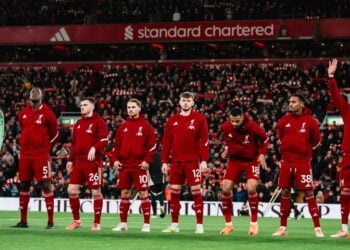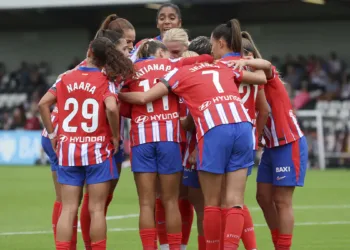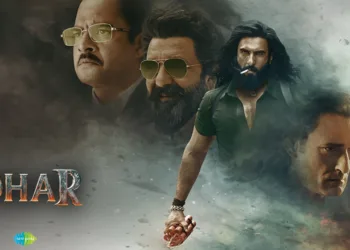The honeymoon period may be ending for Marcus Rashford at Barcelona. After establishing himself as one of the Catalan giants’ most productive players during an unexpected opportunity, the English forward now faces his most significant test yet – the imminent return of captain and talisman Raphinha from injury. What happens next could define whether Rashford’s Spanish adventure becomes a permanent success story or merely a temporary bright spot in a career filled with contradictions.
Marcus Rashford has been earning praise in Spain for his form at Barcelona. Thrust into the starting lineup after Raphinha’s injury, he has logged more minutes than everyone except Eric García and is the team’s most productive player with six goals and seven assists. These numbers tell the story of a player who has seized his moment, but they also raise questions about sustainability once competition for places intensifies.
In Raphinha’s absence, he has become an important piece for Hansi Flick. However, the English forward’s position is about to become significantly more precarious.
Table of Contents
The Imminent Challenge: Raphinha’s Return
But the Brazilian is expected to get medical clearance to return on Saturday versus Athletic Club, and there’s a real chance Rashford’s minutes start to dwindle once the captain and talisman is back. This looming reality presents Barcelona with both a selection dilemma and Marcus Rashford with a career-defining challenge.

The stakes couldn’t be higher. Rashford is unquestionably a star. The debate isn’t whether he belongs in that category but how much influence he really has. Barcelona’s recent struggles have only intensified the scrutiny on every player’s contribution.
Barcelona’s Worrying Form Dip
The timing of Raphinha’s return couldn’t be more critical for Barcelona’s season. Flick built a ruthless attacking machine in his first year at the club, but that machine is beginning to misfire. A 2-1 loss to Paris Saint-Germain started a worrying slump. An embarrassing 4-1 defeat to Sevilla followed, along with a loss against Real Madrid and then a 3-3 draw with Club Brugge.
These results represent more than isolated setbacks – they signal systemic issues with Barcelona’s attacking cohesion and defensive solidity. The statistical evidence supports the eye test. The underlying numbers confirm the dip even if it is only slight – 2.75 goals per game this season compared to 2.90 last year, 2.10 xG per match versus 2.42 last season. Their big chances are down too, from 4.2 last year to 3.6 per game this season.
While Barcelona’s struggles stem from multiple factors, Marcus Rashford’s inconsistency has been part of the equation. The margins aren’t massive but Barcelona aren’t as productive as they were during Flick’s first 12 months in charge. Rashford’s inconsistency is part of the problem.
The Numbers Behind Rashford’s High-Volume Attack
At first glance, Marcus Rashford’s attacking statistics appear impressive. There’s nothing wrong with Rashford’s attacking numbers at first glance. Thirteen goal involvements in 16 games is a solid output, and he is heavily involved too, touching the ball 60.2 times per 90, by far the highest number of his career.
Rashford’s Production Compared to European Elite
| Metric | Marcus Rashford | Raphinha (Before Injury) | Context |
|---|---|---|---|
| Goals & Assists per 90 | 1.03 | 1.08 | Near-identical production |
| Total Goal Involvements | 13 in 16 games | – | Solid output |
| Touches per 90 | 60.2 | – | Career high for Rashford |
| Shots per Game | 4.5 | – | Second only to Mbappé (5.0) in top 5 leagues |
| xG per Shot | 0.07 | – | Career low for Rashford |
| Tackles & Interceptions per 90 | 0.6 | 1.5 (last season) | Significant defensive gap |

Rashford is producing 1.03 goals and assists per 90 this season, compared to Raphinha’s 1.08 before the injury. Only Kylian Mbappé (5.0) is taking more shots per game than Rashford (4.4) across the top five European leagues among forwards with at least 720 league minutes played this season.
The Shot Selection Problem
However, the volume of Marcus Rashford’s shooting masks a concerning efficiency issue. He is also shooting more often than ever with 4.5 shots per game, but his xG per shot is down to 0.07, which is a career-low, suggesting he’s launching shots from poor positions or forcing low-value efforts.
This pattern didn’t escape Hansi Flick’s notice. Flick hinted at a deeper concern about Rashford’s end product in early November. After Barcelona’s win over Elche, he remarked: “When you see the chances he has, one or two more goals would be good“.
The German tactician’s observation, while diplomatically phrased, highlighted a fundamental issue – Marcus Rashford is getting into dangerous positions regularly but isn’t converting those opportunities at the rate Barcelona needs. It was a subtle comment, but the German manager had a point.
Rashford’s Honest Self-Reflection
To his credit, Marcus Rashford has demonstrated self-awareness about his decision-making challenges. “I just try to do the right things on the pitch,” Rashford said after the same game. “Even today, I could have had more assists or goals, sometimes the decision to shoot or pass was wrong. My focus is not so much on the output. If I am doing the right things, I know I will always be able to score and assist; my focus is with the team, to build relationships and feel comfortable“.

This philosophical approach demonstrates maturity, but at Barcelona, results ultimately matter more than process. Flick did go on to stress that Rashford is an important player. And he is, but he’s arguably not a reliably prolific one. If your team can stomach the wasted chances and the questionable decisions, you still get a player who can change games in your favour.
The Systemic Issues Behind Barcelona’s Struggles
Barcelona’s recent poor form stems from multiple interconnected factors that compound each other. There are several factors behind Barcelona’s drop-off in form since last season. There have been injuries to key players, a noticeable dip in intensity, and the psychological effect that comes when both the squad and their opponents sense those issues. The compounding effect can derail a season.

Marcus Rashford’s contributions exist within this broader context, making it difficult to assess his individual impact in isolation.
The Raphinha Comparison: An Unfair but Necessary Benchmark
We’re comparing him to Raphinha, a player who finished fifth in Ballon d’Or voting and had the season of his life in 2024-25. In one sense, that’s an unfair benchmark but it’s also the reality of the competition Rashford faces for his place. That’s life at Barcelona.
The comparison reveals a crucial distinction in how both players contribute to Barcelona’s system. Put simply, Raphinha functioned as a complementary piece in Barcelona’s attack while producing at a superstar level. Rashford, on the other hand, carries the superstar status while delivering slightly less.
This paradox cuts to the heart of Marcus Rashford’s career-long contradiction. The English forward, at his very best, is a game-winner. He’s explosive, direct and capable of elite finishing. But he still leans too heavily on isolated flashes over steady, reliable production. He can excite and frustrate all in the same sequence.
The Defensive Dimension: Where Rashford Falls Critically Short
Perhaps the most significant difference between Marcus Rashford and Raphinha lies not in attacking production but in defensive contribution and work rate. This distinction becomes particularly important in understanding why Raphinha’s return poses such a threat to Rashford’s playing time.
Flick’s Demanding System Requirements
Hansi Flick’s attacking system places extraordinary demands on every player, requiring constant vigilance and immediate reactions. Flick’s attacking system depends on absolute focus once the ball is lost and near-constant defensive awareness even when you’re attacking the opposition’s penalty area.
The intensity required is almost superhuman. Iñigo Martínez, the former Barcelona defender, put it best when he was asked about the vigilance Flick’s system requires: “Between the coffee I drank to stay alert during the game and the stress you carry having to be constantly aware of the opponent, I couldn’t sleep for hours after a game”.
The Stark Statistical Reality
Marcus Rashford’s defensive numbers reveal a significant gap compared to his teammates and the player he’s replacing. Rashford has averaged 0.6 tackles & interceptions per 90 this season in La Liga. Dani Olmo and Lamine Yamal are both averaging 2.0 in 2025-26, and last season Raphinha averaged 1.5.
The defensive disparity becomes even more pronounced in Champions League fixtures, where the intensity level increases. In the Champions League this term, Rashford’s 18.9 high-intensity pressures applied is the third fewest among outfield players at the club, behind only centre-backs Eric García and Pau Cubarsí.
Raphinha: The Counter-Pressing Leader
Raphinha’s defensive contribution set the standard for Barcelona’s attacking players. Raphinha was undoubtedly the leader of Barcelona’s counter-press. He’s only played 90 minutes this season in Europe but produced 30 high-intensity pressures, while the year before he averaged 31.9 over more than 1,200 minutes.
This relentless work rate wasn’t just about statistics – it set the tone for the entire team. Sport reported on Wednesday that the return of Raphinha was a major boost given his aggression and intensity, not just during games but in training too. His 34 goals and 26 assists last season grabbed the headlines but it was what he did out of possession that allowed Barcelona the platform to win La Liga, the Copa del Rey and come to within second of reaching the UEFA Champions League final.
Rashford’s Future at Barcelona: Multiple Scenarios
That’s not to pin any reductive label on Rashford. It doesn’t mean he shouldn’t be in Thomas Tuchel’s World Cup squad, or that Barcelona shouldn’t consider signing him permanently. The situation remains fluid with several factors in play.
The Managerial Uncertainty Factor
Recent reports have suggested Flick is leaving at the end of the season, and a new manager may view Rashford differently and assign him another role with different defensive expectations. This potential coaching change adds another layer of uncertainty to Marcus Rashford’s Barcelona future and could completely reshape his prospects at the club.
Opportunities Through Squad Rotation
Barcelona’s demanding schedule across multiple competitions provides reasons for optimism. There will likely be more injuries and opportunities this season for Rashford to continue to produce at the level he is right now, but he will always be haunted by Raphinha’s status.
The physical toll of Flick’s high-intensity system virtually guarantees rotation will be necessary, giving Marcus Rashford chances to prove his worth even with Raphinha available.
The Positional Solution
Rather than direct competition with Raphinha on the left wing, Hansi Flick may explore alternative tactical arrangements. Rather than letting him fight directly with Raphinha for minutes, Flick may choose to use Rashford through the middle. Against Girona, he offered nothing from the left but suddenly came alive once he moved centrally. Even the coaching staff aren’t aligned as to his best position.

This tactical flexibility could prove crucial. The production is there, even if it takes Rashford more chances to get to the point. He has earned Flick’s trust and become an important player in one of the best teams in the world. He was brought in as a versatile forward and will likely have every chance to show off that versatility in the coming weeks and months.
The Manchester United Legacy and Career-Long Contradiction
Understanding Marcus Rashford’s current situation requires acknowledging the weight of expectations he’s carried throughout his career. For his entire career, Rashford has been chasing the standard he set for himself as a teenager at Manchester United playing for his boyhood club, living a dream shared by thousands of kids in Manchester and beyond. The narrative was irresistible.
That early promise created expectations that have shaped every subsequent chapter of his career. But given the player he is, the frustration and the contradictions that come with watching him were just as inevitable.
The Reality of Elite-Level Inconsistency
The fact is, if Raphinha returns from injury and can recapture anything like the form he has shown over the past 18 months, Rashford as the incumbent will have to reshape his game. This adjustment represents perhaps the greatest challenge of Marcus Rashford’s career.
The pattern of his performances follows a predictable cycle. Rashford can be decisive. But it’s equally important to recognise the inevitable dips. There will be spells where he can’t hit a barn door, moments where he switches off. And then, just as inevitably, there will be moments of genuine brilliance.
This unpredictability makes Marcus Rashford simultaneously valuable and problematic for a team with championship aspirations. Barcelona needs consistency, but they also can’t afford to ignore match-winners when those brilliant moments arrive.
The Defining Question
The ultimate question facing Marcus Rashford at Barcelona isn’t about talent or potential – those have never been in doubt. Will he get the platform to keep producing at this level? Or will he fade into the background at the Camp Nou? We’re about to find out.
Raphinha’s return from injury will provide the answer. If the Brazilian captain rediscovers his Ballon d’Or-worthy form from last season, Marcus Rashford will need to either adapt his game to meet Hansi Flick’s defensive demands, excel in a different position, or accept a reduced role at one of Europe’s elite clubs.

The coming weeks will reveal whether Marcus Rashford’s Barcelona renaissance was the beginning of a new chapter or merely an intermission between the struggles that have defined recent years. With Raphinha set to return against Athletic Club, the English forward’s moment of truth has arrived.
Read More: How Haiti Reached the 2026 World Cup Without Ever Playing at Home
FAQs
How many goals and assists does Marcus Rashford have at Barcelona?
Marcus Rashford has been Barcelona’s most productive player with six goals and seven assists in sixteen appearances. He’s producing 1.03 goals and assists per 90 minutes, which nearly matches Raphinha’s 1.08 per 90 before injury. Rashford has logged more minutes than everyone except Eric García during Raphinha’s absence.
Why is Marcus Rashford’s shooting efficiency a concern at Barcelona?
Despite taking 4.5 shots per game (second only to Kylian Mbappé’s 5.0 across Europe’s top five leagues), Rashford’s expected goals per shot is just 0.07 – a career low. This suggests he’s taking shots from poor positions or forcing low-value efforts. Manager Hansi Flick noted after the Elche game that “one or two more goals would be good” given the chances Rashford gets.
How does Marcus Rashford’s defensive work compare to Raphinha’s?
The defensive gap is significant. Rashford averages 0.6 tackles and interceptions per 90 in La Liga compared to Raphinha’s 1.5 last season. In Champions League, Rashford’s 18.9 high-intensity pressures is the third-lowest among outfield players, while Raphinha produced 30 pressures in just 90 minutes this season and averaged 31.9 over 1,200+ minutes last year.
What position might Marcus Rashford play when Raphinha returns?
Hansi Flick may deploy Rashford centrally rather than competing directly with Raphinha on the left wing. Against Girona, Rashford offered little from the left but came alive when moved to a central position. The coaching staff isn’t fully aligned on his best position, suggesting tactical flexibility will be explored to accommodate both players.
Could Marcus Rashford’s Barcelona future be affected by a managerial change?
Yes, recent reports suggest Hansi Flick may leave at season’s end, which could significantly impact Rashford’s prospects. A new manager might view him differently and assign different defensive expectations that better suit his strengths. Rashford’s versatility and proven production give him opportunities regardless of who manages Barcelona next season.








